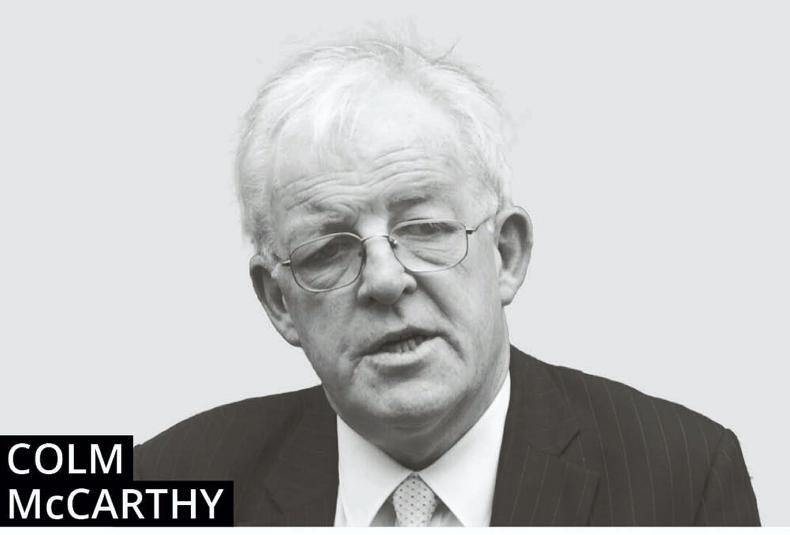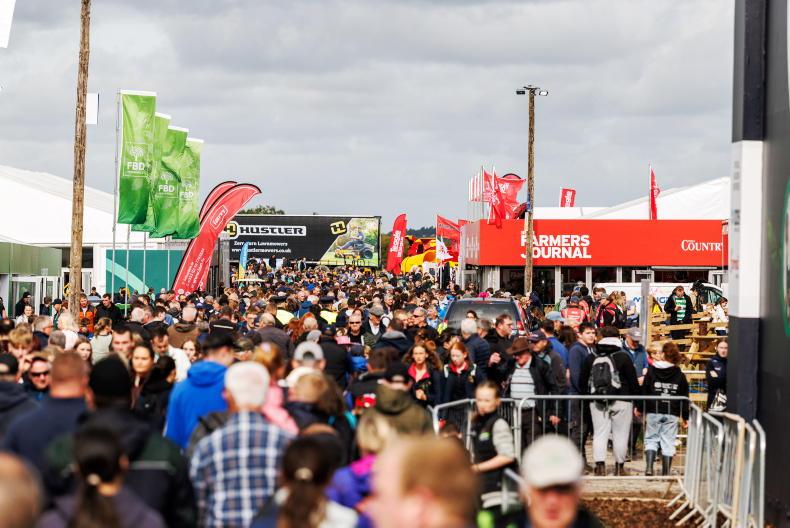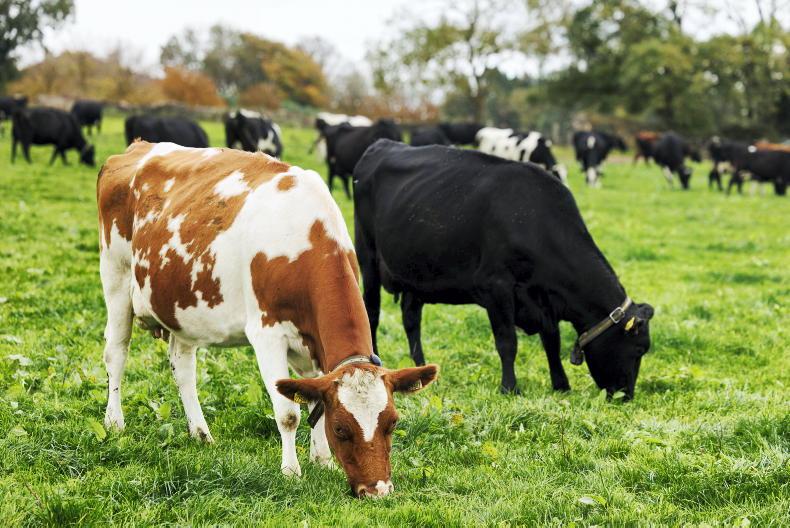Just because the COVID-19 crisis is immediate does not mean that Brexit has gone away. Unless the British government is bluffing, the worst possible form of Brexit is about to be foisted on Europe and on to the UK itself.
There are four weeks left during which the UK can seek an extension to the transition period. Unless the UK seeks an extension, which could be either one or two years but can only be sought once, transition ends on 31 December.
During this time, the UK stays in both the single market and customs union on the same basis it did when it was a member of the EU, from which it departed finally on 31 January last.
The UK would lose any preferential access to the European market and to those markets covered by EU free trade deals with non-EU members
The EU has signalled that an extension, if sought, will be granted. Since everyone now accepts that a satisfactory free trade agreement cannot be negotiated in the time remaining, no extension means no free trade agreement (FTA) and the UK becomes a third country with no formal trade arrangement with the EU, beyond those available to anyone.
The UK would lose any preferential access to the European market and to those markets covered by EU free trade deals with non-EU members. Between the two, about 60% of the UK’s external trade is affected, an argument which cut no ice during the debate over Brexit and appears to cut no ice with Boris Johnson’s government today.
The political cost would be an undetermined contribution to the EU budget for a couple of years
There is no significant economic or financial cost to seeking and securing an extension, during which a preferential deal with the EU could conceivably be negotiated. The political cost would be an undetermined contribution to the EU budget for a couple of years, peanuts compared to the costs of no-deal, but too high a price for the prime minister and the Tory party, which persuaded the electorate to ‘get Brexit done’.
The Financial Times has been hinting darkly at the underlying political calculation. The chaos that will ensue from a no-deal outcome will barely be noticed amid the economic dislocation delivered by the COVID-19 recession.
There have been hardly any negotiations, but politically there can be no climb-down, so no request for an extension
Johnson had set his face against an extension after his December election victory, in the hope that it would strengthen his negotiating hand. There have been hardly any negotiations, but politically there can be no climb-down, so no request for an extension.
If this is truly the mindset in Downing Street, it sets a new standard in recklessness – the COVID-19 recession is bad enough, but it provides whatever cover is needed to hide the climb-down.
To superimpose the no-deal dislocation next January on an economy unlikely to be greatly recovered would be an amazing decision. Johnson is sliding in the polls as his unsure handling of COVID-19 registers with the public – tragically, the UK’s fatality rate looks set to exceed those of Europe’s other large countries.
Tariffs
The UK has published the tariffs that would apply from 1 January 2021, applicable to all countries with which the UK had not, by that time, secured a preferential trade agreement. This would mean all EU-27 members, which currently face zero tariffs on 100% of exports to the UK. Only 44% of EU-27 exports to the UK would enjoy zero tariffs if there is no deal. Sectors affected include agriculture and automobiles.
There will also be a 10% tariff on cars imported from Europe, where non-tariff barriers will also disrupt supply chains
There would be impositions mirroring the EU’s common external tariff on several categories of Irish exports, with the most potential damage falling on beef, heavily reliant on the UK market.
There will also be a 10% tariff on cars imported from Europe, where non-tariff barriers will also disrupt supply chains. The UK car industry has been sacrificed if this set of proposals goes through and it is not clear that British agriculture can be fully protected either – the Welsh lamb trade, for example, will not regard tariffs on imports as adequate compensation for the loss of the French market.
There will be price increases to cover the EU tariffs, as well as supply chain disruption
Irish consumers tend to get forgotten, but a big portion of the product range at your local supermarket is imported from UK processors. There will be price increases to cover the EU tariffs, as well as supply chain disruption.
If the UK and the EU manage to revive the stalled negotiations and secure a comprehensive deal – through negotiations on Zoom presumably – none of this needs to happen, even without an extension to the transition period.
Bear in mind that the UK has set itself the task of negotiating simultaneously a ‘saviour’ free trade deal with the US
But the experts thought the timetable far too ambitious, even before the COVID-19 crisis.
Bear in mind that the UK has set itself the task of negotiating simultaneously a ‘saviour’ free trade deal with the US, currently in the most protectionist mindset anyone can remember and picking fights not just with China but with neighbouring trade partners in Canada and Mexico.
There is time for a change of heart in London and a request for an extension to transition, but a bad situation for Ireland could get worse.
Read more
UK publishes tariff proposals
Just because the COVID-19 crisis is immediate does not mean that Brexit has gone away. Unless the British government is bluffing, the worst possible form of Brexit is about to be foisted on Europe and on to the UK itself.
There are four weeks left during which the UK can seek an extension to the transition period. Unless the UK seeks an extension, which could be either one or two years but can only be sought once, transition ends on 31 December.
During this time, the UK stays in both the single market and customs union on the same basis it did when it was a member of the EU, from which it departed finally on 31 January last.
The UK would lose any preferential access to the European market and to those markets covered by EU free trade deals with non-EU members
The EU has signalled that an extension, if sought, will be granted. Since everyone now accepts that a satisfactory free trade agreement cannot be negotiated in the time remaining, no extension means no free trade agreement (FTA) and the UK becomes a third country with no formal trade arrangement with the EU, beyond those available to anyone.
The UK would lose any preferential access to the European market and to those markets covered by EU free trade deals with non-EU members. Between the two, about 60% of the UK’s external trade is affected, an argument which cut no ice during the debate over Brexit and appears to cut no ice with Boris Johnson’s government today.
The political cost would be an undetermined contribution to the EU budget for a couple of years
There is no significant economic or financial cost to seeking and securing an extension, during which a preferential deal with the EU could conceivably be negotiated. The political cost would be an undetermined contribution to the EU budget for a couple of years, peanuts compared to the costs of no-deal, but too high a price for the prime minister and the Tory party, which persuaded the electorate to ‘get Brexit done’.
The Financial Times has been hinting darkly at the underlying political calculation. The chaos that will ensue from a no-deal outcome will barely be noticed amid the economic dislocation delivered by the COVID-19 recession.
There have been hardly any negotiations, but politically there can be no climb-down, so no request for an extension
Johnson had set his face against an extension after his December election victory, in the hope that it would strengthen his negotiating hand. There have been hardly any negotiations, but politically there can be no climb-down, so no request for an extension.
If this is truly the mindset in Downing Street, it sets a new standard in recklessness – the COVID-19 recession is bad enough, but it provides whatever cover is needed to hide the climb-down.
To superimpose the no-deal dislocation next January on an economy unlikely to be greatly recovered would be an amazing decision. Johnson is sliding in the polls as his unsure handling of COVID-19 registers with the public – tragically, the UK’s fatality rate looks set to exceed those of Europe’s other large countries.
Tariffs
The UK has published the tariffs that would apply from 1 January 2021, applicable to all countries with which the UK had not, by that time, secured a preferential trade agreement. This would mean all EU-27 members, which currently face zero tariffs on 100% of exports to the UK. Only 44% of EU-27 exports to the UK would enjoy zero tariffs if there is no deal. Sectors affected include agriculture and automobiles.
There will also be a 10% tariff on cars imported from Europe, where non-tariff barriers will also disrupt supply chains
There would be impositions mirroring the EU’s common external tariff on several categories of Irish exports, with the most potential damage falling on beef, heavily reliant on the UK market.
There will also be a 10% tariff on cars imported from Europe, where non-tariff barriers will also disrupt supply chains. The UK car industry has been sacrificed if this set of proposals goes through and it is not clear that British agriculture can be fully protected either – the Welsh lamb trade, for example, will not regard tariffs on imports as adequate compensation for the loss of the French market.
There will be price increases to cover the EU tariffs, as well as supply chain disruption
Irish consumers tend to get forgotten, but a big portion of the product range at your local supermarket is imported from UK processors. There will be price increases to cover the EU tariffs, as well as supply chain disruption.
If the UK and the EU manage to revive the stalled negotiations and secure a comprehensive deal – through negotiations on Zoom presumably – none of this needs to happen, even without an extension to the transition period.
Bear in mind that the UK has set itself the task of negotiating simultaneously a ‘saviour’ free trade deal with the US
But the experts thought the timetable far too ambitious, even before the COVID-19 crisis.
Bear in mind that the UK has set itself the task of negotiating simultaneously a ‘saviour’ free trade deal with the US, currently in the most protectionist mindset anyone can remember and picking fights not just with China but with neighbouring trade partners in Canada and Mexico.
There is time for a change of heart in London and a request for an extension to transition, but a bad situation for Ireland could get worse.
Read more
UK publishes tariff proposals









SHARING OPTIONS